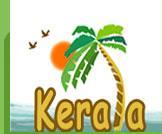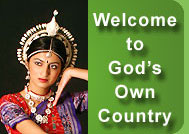|
|
|
Festivals of
Kerala |
|
|
Kerala is
a diverse state in India. Kerala is a land where
festivals never end. Various festivals are celebrated in
Kerala round the year but the dates of these festivals
change every year according to the indigenous Malayalam
calendar. These festivals are an essential part of the
state and observed with great enthusiasm and fun in
which the people of all caste and religion participate.
Today, these festivals are perhaps the only occasion
when the classical, folk and ritual arts of the Kerala
come alive and as well as represents the true tradition
and culture. During
|
 |
|
|
the festivals,
the people clean and decorate their houses, enjoy get
together with friends and relatives, exchange gifts, take part
in rituals, processions and offer prayers. New attire, dance
and music, all add to their joyful rhythm. It is also
interesting to know that no celebration in Kerala is complete
without an elephant pageant. Some of the major festivals which
are celebrated in Kerala during the year are Onam, Thrissur
Pooram, Thiruvathira, Vishu, Navarathri, Makaravillakku and
Easter. |
|
|
|
Makaravillakku Festival
Makaravillakku Festival is celebrated in the month of January
in Sabarimala in Pathanamthitta. This place attracts thousands
of devotees from all over India, mainly from south India. The
presiding deity in Sabarimala is the lord Ayyappa also known
as Dharma Sastha, who is considered as a symbol of unity
between Vaishnavites and Saivites.
Kerala Village Fair
Gramam, the Kerala Village Fair is held in the month of
January, near the shores of the famous Kovalam beach in
Kerala. This fair is held for 10 days when the entire village
is recreated. The central attraction of the fair is an
enchanting recreation of a traditional family home known as
Nalukettu. It is a quadrangular structure with a central open
courtyard, corridors, massive pillars and windows, a typical
architectural style of Kerala. In the fair ground there are
stalls which sell hand crafted curios, bell metal mirrors,
woven cloth, coir products, conch and coconut shell items.
Spinning wheels, handlooms for making the Khadi cloth are also
on display. In the evening various dances, music and martial
arts are performed in the open air auditorium of the village.
|
|
|
|
Aluva
Sivarathri Festival
The Aluva Sivarathri festival is one of the most
colourful festival celebrated by the Hindus in the month
of Kumbha (February - March) in Kerala. This festival is
celebrated on the banks of the river Periyar at Aluva,
about 16 kms. from Ernakulam. This festival is
celebrated to commemorate the day on which Lord Siva
consumed the deadly poison to save the world from
destruction. On this day, the pilgrims awake the whole
night, read the Puranas and the other holy texts and
return home next morning after performing the Bali
(ritual) at dawn. A ritual trade fair and various
cultural programmes are also organized during the
festival.
|
 |
|
|
|
Thrissur
Pooram Festival
Thrissur Pooram is the most spectacular festival of Kerala
celebrated at Thrissur in the month of Medom (April - May).
This festival was introduced by Sakthan Thampuran, the
Maharaja of erstwhile Kochi state. In the beginning of April,
the people of Kerala began their search for the best elephants
in the state. After their search is finished then they send a
procession of decorated elephants to Thrissur to participate
in the festival. The main feature of this festival is the
procession of about 101 decorated elephants that assemble in
the premises of the Vadakumnatha temple for the festival. The
procession is accompanied by the Panchavadyam, where the five
instruments create a spell binding crescendo of music and the
decorated groups of elephants face each other. The festival
ends with a spectacular display of fireworks. |
|
|
|
Vishu
Festival
The Vishu festival is celebrated on the first day of
Medam (April-May). This festival is celebrated by the
Hindus all over Kerala as the astronomical New Year day.
It is the common belief that the fortunes of the coming
year depend on the first object they see on the Vishu
day. So the important ceremony connected with this
festival is the Kani Kanal. This kani includes cadjan
leaf book, gold ornaments, fresh and white cloth, some
rice or paddy, bell metal mirror, flowers of the Konna
tree, halved jack fruits, halved coconuts, yellow
cucumbur, and two standing oil lamps emitting sparkling
light. One of the major item of this festival is the
Vishu Kaineettam, which means that the money is gifted
to the children and to the poor people by the elder
members of the family. On this day the people burst
firecrackers and visit the temple. |
 |
|
|
|
|
|
|
Easter Festival
Easter is celebrated in the month of April by the Christians
all over the Kerala soon after the Good Friday. This festival
is celebrated on the occasion of the rebirth of Christ, as the
triumph of good over evil. This is the very oldest Christian
festival, as old as Christianity itself. The festival is
celebrated with lot of fun and frolic and the Christians offer
special prayer services. The Holy week of Easter is preceded
by 40 days of fasting and prayers. The Easter week is held for
10 days and during this week special prayers are offered in
the Church. |
|
|
|
Onam
Festival
Onam is the most popular and annual harvest festival of
Kerala. Onam is one of the most widely celerated
festivals of Kerala. This festival is celebrated for
almost ten days which start on Attam and ends on
Thiruvonam. This festival is celebrated to welcome the
spirit of the pious King Mahabali from eternal exile and
to assure him that his people are happy and wish him
well. Mahabali ever fond of his land and subjects was
allowed to visit the land once a year on the day of
Onam. On the second day of the festival, every home is
lit bright and decorated in preparation for |
 |
|
|
the visit of
King Mahabali. Greetings are exchanged and lengths of
auspicious saffron cloth are presented by friends to one
another. People adorn their homes with colourful flower
carpets, wear new clothes and prepare a sumptuous lunch for
Mahabali. To mark the Onam festival, the Tourism Week is
celebrated in the state especially in Trivandrum during which
the streets in the city are illuminated and a unique package
of traditional and cultural programmes are staged at the
Kanakkunu Palace and other places. It culminates in a colorful
carnival which the vast majority of people turn out. The major
attraction of this festival is the Vallom Kali, the snake boat
race and the cultural evenings with the classical and folk
dance performances. |
|
|
|
Thiruvathira Festival
The Thiruvathira festival is celebrated in Thiruvathira
in the Dhanu month (December-January). This festival is
celebrated by the women. On the early morning of
Thiruvathira, the devotees visit the Shiva temple which
is considered as highly auspicious. According to the
legends, this festival is celebrated due to the death of
Kamadeva, the mythological God of Love. According to
some other people, Thiruvathira festival is celebrated
as the birthday of Lord Shiva. The main aim of the
festival is the harmony and happiness
|
 |
|
|
of all. Thiruvathirkkali, the main
dance form is also associated with this festival. |
|
|
|
Navarathri
Festival
The Navarathri festival is also one of the most important
festival celebrated by the Hindus in Kerala. This festival is
celebrated in the month of Kanni (September-October) and the
people worship the goddess Saraswati, the goddess of learning.
On the Durgashtami day, the Puja Veppu ceremony is performed.
In the homes, the books and granthas are arranged tastefully
in a decorated room and all sorts of study and work are given
up. The whole Mahanavami day is devoted in the worshipping of
goddess Saraswathi. The Vijaya Dasami day is observed as the
day for the break up of the Puja and the initiation of
children into the study of the alphabets and work and study
are resumed.
Pongala Festival
The ten day Pongala festival is held at Attukal Bhagavathy
temple, 2 kms. from Trivandrum. this festival attracts
thousands of female devotees from many parts of the country.
Mens are not allowed in the vicinity of the temple during the
Pongala festival. Pongala is a kind of sweet porridge,
considered to be the goddess favourite offering. It is cooked
by each devotee in a clay pot on the open fire and the long
line of women making the ritual offering extends up to East
Fort and beyond.
Chandanakudam Mahotsavam
This colourful Islamic festival is celebrated to commemorate
Bee Umma, a saintly lady whose tomb is in Beemapally near
Trivandrum. The devotees bring money in pots decorated with
flowers, incense sticks and sandalwood paste, as an offering
to the deity during the festival. |
|
|
|
Nishagandhi Dance and Music Festival
The Nishagandhi Dance and Music Festival of Indian
classical dances and music is held at Nishagandhi Open
Air Theatre, Kanakkunu Palace grounds, Trivandrum.
Bharatnatyam, Kathak, Kathakali, Kuchipudi, Manipuri,
Mohiniyattam, Odissi, specially choreographed ballet
combining one or more of these classical dance forms,
Classical music (Instrumental and vocal), Jugalbandi are
performed in the evening. |
 |
|
|



